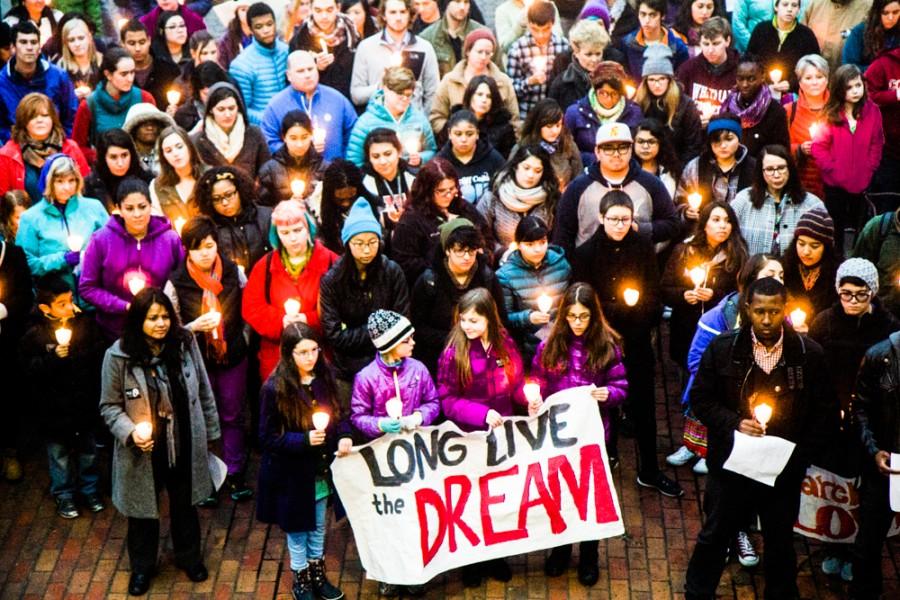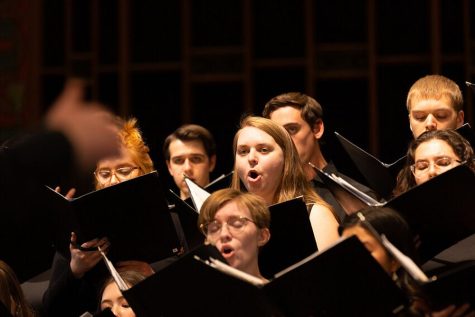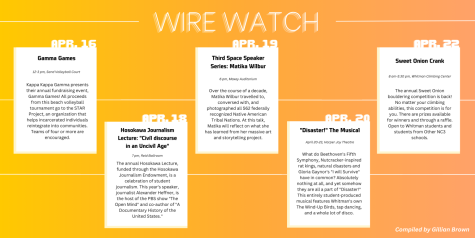Martin Luther King Celebrated With Service, Lecture
Photo by Marra Clay.
January 28, 2016
Dr. Martin Luther King Jr. would have turned 87 last Monday. His legacy of civil rights activism was celebrated across the nation, and Whitman offered its own tribute in the form of a march, a keynote speaker and a day of service.
In the current climate of police brutality against people of color, a presidential contest in which race is a serious issue and the Black Lives Matter movement, the events held serious relevancy. They also come when discussions of racial inequity are abound on college campuses. Last fall, events at the University of Missouri and Yale captured headlines as students protested for justice, and Whitman joined dozens of other campuses in rallies for solidarity.
The week’s events began with a march downtown, jointly organized by Whitman and Walla Walla University. After an introduction from student leaders of both schools in the Reid ballroom, a group of nearly 300 began walking to the intersection of 1st and Main, where the Walla Walla University choir was waiting.
Reflecting on the events, students and faculty from both institutions spoke about how the current state of racial injustice in the US reflects back to the work of Dr. King, and what he would say.
“I think he’d be kind of pissed about certain things,” sophomore Maxx Borges said, Whitman’s co-president of GLBTQ. “Maybe it would have turned out different though if he’d still been alive, [the movement] would have a bigger voice, an older one on their side.”
On Thursday, diversity consultant Verna Myers addressed this question, too. What would King say about Donald Trump, campus activists, racism against migrants in Europe and violence against young black men like Tamir Rice and Freddie Gray?

“What King would tell us is that this is the time that we can actually push to move his dream forward,” she said. “We say that we’re the country of law and progress…but there is a profound gap in our professed ideals and reality.”
Myers was introduced on Thursday by senior May-Lannie Lozano, a leader in BSU, who helped organize a rally on the library steps last November to stand in solidarity with students at campuses like Missouri and Yale. A lawyer, author and diversity consultant, Myers challenged the audience on Cordiner to “build bridges,” and work to combat racist behavior and action on a day-to-day basis.
“We have gone as far we can with color blindness. We’re not looking for those who are color blind, we are looking for those who are willing to open there eyes, to pay attention to the facts: that difference is making a difference in people’s life outcomes,” she said. “Bridge builders look to understand rather than to be understood.”

Held in Cordiner and sponsored by BSU, the President’s Office, the Intercultural Center and the Student Engagement Center, Myers’ talk was sparsely attended. The audience was mostly students and Whitman staff, with about a dozen community members
Myers’ calls to action resonated with many student and faculty sentiments at the march.
“Get involved,” Borges said, when asked about what students can do to carry on MLK’s legacy. “It’s one thing to go out on the street and say ‘this is what we’re doing, this is what we stand for,’ and it’s another to actually go do it and stand for it.”
This kind of engagement can be supported in the classroom, too, according to Professor of Art History Lisa Uddin, a member of the Global Studies of the Steering Committee who teaches classes that deal directly with race and visual culture.
“As an educator, I think it’s about developing deeper and more substantive understandings of the conditions of racial violence in this country and making a connection between that understanding and the question of what is to be done,” she said. “So knowledge and activism at the same time.”
Over 100 students, faculty and community members got involved through a service day on Saturday, organized by the Student Engagement Center. The 12 project sites included the YMCA, the Carnegie Picture Lab, Blue Mountain Action Council and a host of other local organizations.
According to Whitman Community Service Coordinator Abby Juhasz, who organized the event, the day encourages the kind of social justice work that King himself is remembered for.
“He believed in a nation of freedom and justice for everyone and encouraged all citizens to strive to make the United States a better place to live,” Juhasz said in an email. “Participating in service is a way to translate Dr. King’s message into community action that can address issues of social justice and civil rights.”










